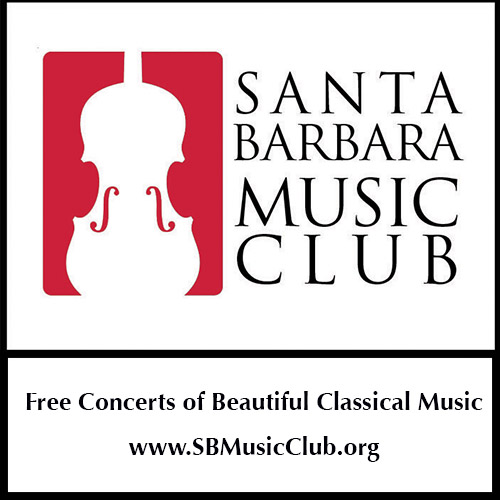
- This event has passed.
Santa Barbara Music Club Free Concerts
January 27, 2018 @ 3:00 am PST

On SATURDAY, JANUARY 27 AT 3 PM, the Santa Barbara Music Club will present another program in its popular series of concerts of beautiful Classical music. This concert will be held at the Faulkner Gallery of the Santa Barbara Public Library, 40 E. Anapamu Street. Admission is free.
One of the highlights of Santa Barbara Music Club’s concerts is the opportunity for audiences to hear great music from a variety of historical periods, with a diversity of musical forms, performed by excellent artists. This concert features arias by Georges Bizet, Charles Gounod, and Jacques Offenbach; Antonio Vivaldi’s Concerto No. 23 in G minor, F. VIII and Mathieu Lussier’s Spring Lullaby, both for bassoon and string quartet; and Franz Schubert’s Fantasie in C major, D. 934 for Violin and Piano.
Soprano Deborah Bertling and pianist Renée Hamaty will perform a selection of French Arias: Georges Bizet’s Je dis, from “Carmen,” Charles Gounod’s Jewel Song, from “Faust,” and Jacques Offenbach’s Belle nuit, o nuit d’amour (Barcarolle) from “The Tales of Hoffman.”
Carmen, a four act opéra-comique by Georges Bizet (1838-1875), premiered in 1875. It was groundbreaking in its realistic depiction of working class life in 1830s Seville and is notable also for memorable melodies, brilliant orchestration, and skillful musical representation of the emotions and suffering of the characters. Je dis que rien ne m’épouvante, (“I say that nothing can frighten me”), sung by the character of Micaëla, comes from Act III of the opera.
Charles Gounod (1818-1893) wrote Faust in 1858 and made changes and additions until about 1869. The opera was premiered in 1859. The libretto is based Michel Carré’s Faust et Marguerite and Gérard Nerval’s translation of Part I of Goethe’s Faust. The Jewel Song, “Ah! je ris de me voir si belle” (“Ah! I laugh to see myself so fair”) is sung by the character of Marguerite in Act III.
Jacques Offenbach (1819-1880) was a French composer of German origin. His operas, often satirical and/or comic, contain some of the most exhilaratingly tuneful music of all time. The success of Offenbach’s works outside of France helped the operetta become an established international genre, eventually evolving into the 20th-century musical. The Tales of Hoffmann was Offenbach’s last work. The French libretto was written by Jules Barbier, based on three short stories by E. T. A. Hoffmann, who is the protagonist of the story. The Barcarolle Belle nuit, o nuit d’amour (“Beautiful night, oh night of love”) is from Act III.
Bassoon soloist Paul Mori and a string quartet composed of violinists Sierra Farrar and Mirah Ray, violist Erik Fauss, and cellist Timothy Beccue will perform Antonio Vivaldi’s sparkling Bassoon Concerto No. 23 in G minor, F. VIII and Mathieu Lussier’s lyrical Spring Lullaby (2005).
Antonio Vivaldi (1678-1741) was an Italian composer and violinist who made a major contribution to the form of the concerto and the style of late Baroque instrumental music. Of the roughly 500 instrumental concerti that survive, more than 300 are scored for a solo instrument with string orchestra and continuo. While the majority of those are for solo violin, he wrote 40 for bassoon. Like many of his concertos, the Bassoon Concerto No. 23 in G minor, F. VIII is in three movements, the outer ones fast and rhythmic and the middle slow movement lyrical, almost aria-like.
A versatile musician with an inquiring mind, bassoonist-composer-conductor Mathieu Lussier (b. 1973) energetically and passionately promotes the modern and baroque bassoon as solo instruments throughout North America and Europe. His works are heard regularly in concert halls in North America, Europe and Australia. In August 2009, his Bassango, in its version for bassoon and string orchestra, was a prizewinner in the category Contemporary Classical Song at the Just Plain Folks Awards in Nashville, Tennessee. Spring Lullaby (2005) is melodically driven, highlighting the bassoon’s capacity for sweetly tender lyricism.
The program concludes with Franz Schubert’s Fantasie in C major, D. 934, performed by Han Soo Kim, violin and Neil Di Maggio, piano.
Franz Schubert (1797-1828) was an Austrian composer who made important contributions in the areas of orchestral music, chamber music, piano music, and the German lied, or Art Song. His Fantasie in C major, D. 934, composed in 1827, is formally and harmonically adventurous, technically demanding, and filled with heartfelt lyricism.
The mission of the Santa Barbara Music Club is to contribute to the musical life of our community through the following:
•Presentation of an annual series of concerts, free to the public, featuring outstanding solo and chamber music performances by Performing Members and invited guests;
•Presentation of community outreach activities, including bringing great music to residents of area retirement homes;
•Aiding and encouraging musical education by the disbursement of scholarships to talented local music students.
For information on this or other Santa Barbara Music Club programs and performing artists, visit SBMusicClub.org.


